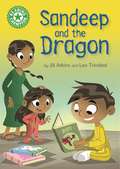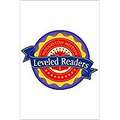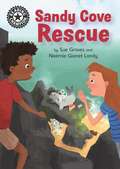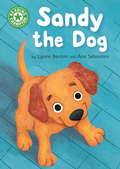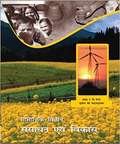- Table View
- List View
Sandeep and the Dragon: Independent Reading Green 5 (Reading Champion #130)
by Jill AtkinsIn this story, Sandeep has to get his little sister to go to sleep. All is well until the dragon in his book comes alive and wants to play!Reading Champion offers independent reading books for children to practise and reinforce their developing reading skills.Fantastic, original stories are accompanied by engaging artwork and a reading activity. Each book has been carefully graded so that it can be matched to a child's reading ability, encouraging reading for pleasure.Independent Reading Green stories are perfect for children aged 4+ who are reading at book band 5 (Green) in classroom reading lessons.
Sandy Cove Rescue: Independent Reading 13 (Reading Champion #304)
by Sue GravesJess and Spencer have been learning all about their local environment. When they go on a beach clean one Saturday, they are horrified to find a seal cub entangled in plastic. Their quick thinking ensures that the seal is soon in the best place to recover.Reading Champion offers independent reading books for children to practise and reinforce their developing reading skills.Fantastic, original stories are accompanied by engaging artwork and a reading activity. Each book has been carefully graded so that it can be matched to a child's reading ability, encouraging reading for pleasure.The Key Stage 2 Reading Champion Books are suggested for use as follows:Independent Reading 11: start of Year 3 or age 7+Independent Reading 12: end of Year 3 or age 7+Independent Reading 13: start of Year 4 or age 8+Independent Reading 14: end of Year 4 or age 8+Independent Reading 15: start of Year 5 or age 9+Independent Reading 16: end of Year 5 or age 9+Independent Reading 17: start of Year 6 or age 10+Independent Reading 18: end of Year 6 or age 10+
Sandy the Dog: Independent Reading Green 5 (Reading Champion #533)
by Lynne BentonThis story is part of Reading Champion, a series carefully linked to book bands to encourage independent reading skills, developed with Dr Sue Bodman and Glen Franklin of UCL Institute of Education (IOE)Sandy the dog is busy training the family to become the perfect dog owners!Reading Champion offers independent reading books for children to practise and reinforce their developing reading skills.Fantastic, original stories are accompanied by engaging artwork and a reading activity. Each book has been carefully graded so that it can be matched to a child's reading ability, encouraging reading for pleasure.
Sangeet Shastra Darpan Pratham Bhag class 9 and class 10 - Himachal Pradesh Board: संगीत शास्त्र दर्पण प्रथम भाग कक्षा ९ एवं कक्षा १० - हिमाचल प्रदेश बोर्ड
by Shanti Govardhan“संगीत शास्त्र दर्पण प्रथम भाग” हिमाचल प्रदेश बोर्ड के कक्षा 9 और कक्षा 10 के छात्रों के लिए शांति गोवर्धन द्वारा लिखित एक महत्वपूर्ण शैक्षणिक पुस्तक है। यह पुस्तक भारतीय शास्त्रीय संगीत के मौलिक सिद्धांतों और तकनीकों का व्यापक वर्णन करती है। इसमें संगीत की प्राथमिक अवधारणाएँ जैसे स्वर, ताल, राग, और बंदिश को सरल और सुलभ भाषा में प्रस्तुत किया गया है, जिससे छात्र आसानी से समझ सकें। पुस्तक में रागों की संरचना, उनकी विशेषताएँ और उनकी प्रस्तुति के तरीके पर विशेष ध्यान दिया गया है। इसके साथ ही, तालों के प्रकार और उनकी गिनती, स्वर और ताल के बीच के संबंध, और भारतीय शास्त्रीय संगीत की संस्कृति का भी विस्तृत विवरण दिया गया है। लेखक ने संगीत के इन तत्त्वों को सजीव उदाहरणों और प्रायोगिक दृष्टिकोण से समझाया है, जिससे यह पुस्तक न केवल सिद्धांतों की जानकारी देती है बल्कि छात्रों को संगीत के प्रति गहरी समझ और रुचि भी विकसित करती है। यह पुस्तक हिमाचल प्रदेश बोर्ड की पाठ्यक्रम सामग्री के अनुरूप तैयार की गई है और छात्रों को शास्त्रीय संगीत की शिक्षा में एक मजबूत नींव प्रदान करती है। इसमें दिए गए अध्याय और अभ्यास छात्रों को परीक्षा के लिए भी अच्छी तरह से तैयार करते हैं। "संगीत शास्त्र दर्पण प्रथम भाग" कक्षा 9 और 10 के छात्रों के लिए एक आदर्श शैक्षणिक संसाधन है, जो उन्हें संगीत की जटिलताओं को समझने में सहायता करता है और उनकी शैक्षणिक यात्रा में महत्वपूर्ण योगदान देता है।
Sangeet class 11 - GSTB: સંગીત ધોરણ 11 - જીએસટીબી
by Shri Prajapati Kamlesh Swami Hemendra Bhojak Manubhai Shah Shri Rana Shri Shinde Pragya Vaidya Shri Gandhi.આ પુસ્તકમાં અવનઘ વાદ્ય-તબલાનો પૂર્ણ પરિચય તથા તે વાઘોને કેવી રીતે વગાડવા તેની રીત, તેના વિવિધ ગુણો અને અલગ-અલગ માત્રાઓ અને બોલથી બનતા તાલ કેવી રીતે વાગે તેની સરળ અને શાસ્ત્રીય માહિતી આપી સમજાવવામાં આવ્યું છે. તબલાવાદનને સમજવા માટે લય, તાલ, સમ, ખાલી, કાયદા, ટુકડા, રેલા, પરન વગેરે પારિભાષિક શબ્દોનો પરિચય અહીં ઉદાહરણસહિત આપવામાં આવેલ છે
Sangeet class 9 - GSTB: સંગીત ધોરણ ૯ - જીએસટીબી
by Shri Prajapati Kamlesh Swami Manubhai Shah Hemendra Bhojk Shri Rana Geeta Trivedi Jay Shindeધોરણ ૯ સંગીત પાઠ્યપુસ્તક માં ૧૦ પાઠ આપેલ છે અને ૨ સ્વાધ્યાય આપેલ છે.
Sangeet class 10 - GSTB: ધોરણ ૧૦ સંગીત - જીએસટીબી
by Hemendra Bhojak Manubhai Shah Jay Shideસૈદ્ધાંતિક વિભાગ માં ૯ પાઠ આપેલ છે.જેમાં પારિભાષિક શબ્દો,મૂળભૂત શબ્દોની સમજૂતી,રાગોની શાસ્ત્રીય માહિતી,તાલજ્ઞાન,છંદ, વાદ્યપ્રકાર અને ભારતીય સંગીત શૈલી,ભારતીય સંગીતની ઉત્પત્તિ અને સુગમ સંગીત,જીવનચરિત્ર,જીવન અને શિક્ષણમાં સંગીત,પ્રસિદ્ધ સંગીતકારો વગેરે પાઠ આપેલ છે.
Sankhyiki ani Vyavsayik Ganit Third Semester FYB.COM New NEP Syllabus - RTMNU: वित्तीय लेखांकनाचा पाया पहिले सत्र एफ.वाय.बी.कॉम. नवीन एन.इ.पी. अभ्यासक्रम - राष्ट्रसंत तुकडोजी महाराज नागपूर विद्यापीठ
by Prof. B. L. Jibhkate“वित्तीय लेखांकनाचा पाया” हे पुस्तक बी. कॉम. प्रथम वर्षाच्या नवीन अभ्यासक्रमानुसार तयार करण्यात आले असून, ते लेखांकनशास्त्राची प्राथमिक माहिती अगदी सोप्या भाषेत सादर करते. पुस्तकात पुस्तपालन व लेखांकन यातील मूलभूत फरक स्पष्ट करण्यात आला आहे, तसेच लेखांकनाचे सिद्धांत, व्यवहारांची नोंद, तेरीज, अंतिम खाती आणि लेखांकन प्रमाप (AS, IFRS) याविषयी सखोल मार्गदर्शन देण्यात आले आहे. सैद्धांतिक भाग मराठीत असून, प्रात्यक्षिक भाग इंग्रजीत दिला आहे, जेणेकरून विद्यार्थ्यांना दोन्ही माध्यमांतील संज्ञांची समज यावी. लेखांकनाच्या भारतीय व आंतरराष्ट्रीय मानकांचे स्पष्टीकरणही समाविष्ट आहे. पुस्तकाची मांडणी NEP 2020 च्या अनुषंगाने असून, विद्यार्थ्यांचा पाया भक्कम करण्यासाठी ते अत्यंत उपयुक्त ठरते. या पुस्तकात प्राध्यापक व विद्यार्थ्यांसाठी उपयुक्त सैद्धांतिक प्रश्न व स्वाध्याय सुद्धा दिलेले आहेत.
Sanpuru: Japan's Fake Food (Fountas & Pinnell Classroom, Guided Reading Grade 5)
by Dusan Lakicevic Gemma RymerEating Around the World It's fun to experience different cultures when you travel or read a book. Things can be very different from what you know, including the sights to see, the way people speak, and the food. The food in this book is delicious but some of it may be unfamiliar. Find out how and why in this delightful graphic text about a true story of one family's trip to Japan. NIMAC-sourced textbook
Sanrakshan Shastra (Karyapustika) class 9 - Maharashtra Board: संरक्षण शास्त्र (कार्यपुस्तिका) ९वीं कक्षा - महाराष्ट्र बोर्ड
by Maharashtra Rajya Pathyapustak Nirmiti Va Abhysakram Sanshodhan Mandal Pune'संरक्षण शास्त्र' महाराष्ट्र बोर्ड की कक्षा 9 की कार्यपुस्तिका है, जो राष्ट्रीय सुरक्षा, सैन्य बलों, आंतरिक सुरक्षा, और आपदा प्रबंधन पर केंद्रित है। यह पुस्तक भारतीय सेना, नौसेना, वायुसेना, अर्धसैनिक बलों और पुलिस संगठनों की संरचना, कार्य और उनकी भूमिका को स्पष्ट करती है। इसमें राष्ट्रीय सुरक्षा की अवधारणा, बाहरी चुनौतियाँ, भारत के पड़ोसी देशों के साथ संबंध, समुद्री सुरक्षा, और साइबर सुरक्षा जैसे विषयों को शामिल किया गया है। इसके अतिरिक्त, यह कार्यपुस्तिका रक्षा सेवाओं में करियर के अवसरों, सेना में भर्ती प्रक्रिया, और सैन्य बलों में महिलाओं की भागीदारी पर भी प्रकाश डालती है। छात्रों को व्यावहारिक अनुभव देने के लिए चर्चा, क्षेत्रभ्रमण, साक्षात्कार, और भूमिका अभिनय जैसे उपक्रम भी सम्मिलित किए गए हैं। अध्ययन-अध्यापन की दृष्टि से इसमें महत्वपूर्ण विषयों की समीक्षा, परियोजनाएँ, मानचित्र अध्ययन, और सुरक्षा रणनीतियों पर गहन विश्लेषण प्रदान किया गया है। राष्ट्रीय एकता, देशभक्ति, और वैज्ञानिक दृष्टिकोण को विकसित करने पर बल दिया गया है, जिससे विद्यार्थी देश की सुरक्षा और सामाजिक जिम्मेदारियों को बेहतर तरीके से समझ सकें।
Sanrakshanshastra Class 12 - Maharashtra Board: संरक्षणशास्त्र इयत्ता बारावी - महाराष्ट्र बोर्ड
by Maharashtra Rajya Pathyapustak Nirmiti Va Abhysakram Sanshodhan Mandal Puneइयत्ता बारावीचे संरक्षणशास्त्र हे पुस्तक आहे. ह्या पुस्तकामध्ये भारताच्या संदर्भातील राष्ट्रीय सुरक्षेच्या विविध पैलूंचा अभ्यास करणार आहोत. पहिल्या प्रकरणात भारताच्या लष्करी, राजकीय आणि राजनयिक, आर्थिक, विज्ञान आणि तंत्रज्ञान, आणि अंतर्गत राष्ट्रीय सुरक्षा या विविध पैलूंना समजावून घेण्यासाठीचा आराखडा दिलेला आहे. उर्वरित प्रकरणांमध्ये भारताच्या अंतर्गत सुरक्षेला असलेल्या समस्यांसंबंधी जगातील विविध भूभाग व देश यांच्याशी भारताचे असलेले संबंध यांचा परामर्श घेतला आहे. शेवटच्या प्रकरणात भारताला स्वातंत्र्य मिळाल्यापासून शेजारील देशांशी झालेल्या विविध युध्दांची माहिती दिलेली आहे.
Sanrakshanshastra class 11 - Maharashtra Board: संरक्षणशास्त्र इयत्ता अकरावी - महाराष्ट्र बोर्ड
by Maharashtra Rajya Pathyapustak Nirmiti Va Abhysakram Sanshodhan Mandal Puneइयत्ता अकरावीचे पुस्तक हे राष्ट्रीय सुरक्षा या संकल्पनेला केंद्रभूत मानून तयार केले गेले आहे. संरक्षणशास्त्र या विषयाच्या वेगवेगळ्या घटकांचा परिचय यात दिला आहे. यामध्ये राष्ट्रहित आणि राष्ट्रीय सुरक्षा; भूराजनीती; संरक्षण अर्थशास्त्र; लष्करी इतिहास; विज्ञान आणि तंत्रज्ञानांचे कार्य यांचा समावेश केला गेला आहे. या सर्व संकल्पना भारताच्या संदर्भात चर्चिल्या गेले आहेत. संरक्षणक्षेत्रात करिअर करण्याच्या दृष्टीने आवश्यक त्या बाबी या पाठ्यपुस्तकात समाविष्ट केल्या आहेत. त्याचा तुम्हांला निश्चितच उपयोग होईल. पाठ्यपुस्तकाचा अभ्यास करताना सुचवलेले उपक्रम शिक्षक आणि पालकांच्या मदतीने पूर्ण करा. याच बरोबर क्यू. आर. कोडचाही वापर करावा.
Sansadhan Avam Vikas Class 8 - NCERT - 23: संसाधन एवं विकास ८वीं कक्षा - एनसीईआरटी - २३
by Rashtriy Shaikshik Anusandhan Aur Prashikshan Parishadकक्षा 8 के लिए भूगोल की पाठ्यपुस्तक राष्ट्रीय शैक्षिक अनुसंधान और प्रशिक्षण परिषद् इस पुस्तक की रचना के लिए बनाई गई पाठ्यपुस्तक निर्माण समिति के परिश्रम के लिए कृतज्ञता व्यक्त करती है। परिषद् सामाजिक विज्ञान पाठ्यपुस्तक सलाहकार समिति के अध्यक्ष प्रोफ़ेसर हरि वासुदेवन और इस पाठ्यपुस्तक समिति की मुख्य सलाहकार विभा पार्थसारथी की विशेष आभारी है। इस पाठ्यपुस्तक के विकास में कई शिक्षकों ने योगदान दिया, इस योगदान को संभव बनाने के लिए हम उनके प्राचार्यों के आभारी हैं। उन सभी संस्थाओं और संगठनों के प्रति कृतज्ञ हैं जिन्होंने अपने संसाधनों, सामग्री और सहयोगियों की मदद लेने में हमें उदारतापूर्वक सहयोग दिया।
Sanshipt Budhcharit class 8 - NCERT - 23: संक्षिप्त बद्धचरित ८वीं कक्षा - एनसीईआरटी - २३
by Rashtriy Shaikshik Anusandhan Aur Prashikshan Parishadसंक्षिप्त बुद्धचरित कक्षा 8 के लिए हिंदी की पूरक पाठ्यपुस्तक। यह पुस्तक बुद्धचरित 28 सर्गों में था जिसमें 14 सर्गों तक बुद्ध के जन्म से बुद्धत्व-प्राप्ति तक का वर्णन है। किन्तु बुद्धचरितम् मूल रूप में अपूर्ण ही उपलब्ध है। 28 सर्गों में विरचित इस महाकाव्य के दूसरे सर्ग से लेकर तेरहवें सर्ग तक पूर्ण रूप से तथा पहला एवं चौदहवाँ सर्ग के कुछ अंश ही मिलते हैं।
Sanshipt Budhcharit class 8 - NCERT: संक्षिप्त बुद्धचरित कक्षा 8 - एनसीईआरटी
by Rashtriy Shaikshik Anusandhan Aur Prashikshan Parishadसंक्षिप्त बुद्धचरित कक्षा 8 के लिए हिंदी की पूरक पाठ्यपुस्तक। यह पुस्तक विद्यालयी शिक्षा के लिए राष्ट्रीय पाठ्यचर्या की रूपरेखा - 2000 और इस रूपरेखा के अनुरूप तैयार किए गए पाठ्यक्रम पर आधारित है। एन.सी.ई.आर.टी. की कार्यकारिणी समिति की दिनांक 19 जुलाई 2004 को आयोजित बैठक में पाठ्यपुस्तकों की गुणवत्ता से संबंधित सभी पहलुओं पर चर्चा की गई और यह निर्णय लिया गया कि सभी विषयों की पाठ्यपुस्तकों की शीघ्र ही समीक्षा की जाए। इस निर्णय का अनुपालन करते हुए एन.सी.ई.आर.टी. ने सभी पाठ्यपुस्तकों के परीक्षण के लिए 23 त्वरित समीक्षा समितियों का गठन किया। इन समितियों ने संकल्पनात्मक, तथ्यात्मक तथा भाषा संबंधी विविध अशुद्धियों की पहचान की। समीक्षा की इस प्रक्रिया में पहले किए गए पाठ्यपुस्तकों के मूल्यांकन को भी ध्यान में रखा गया। यह प्रक्रिया अब पूर्ण हो चुकी है और पाई गई अशुद्धियों का सुधार कर दिया गया है। हमें आशा है कि पुस्तक का यह संशोधित संस्करण शिक्षण व अधिगम का प्रभावी माध्यम सिद्ध होगा। इस पुस्तक की गुणवत्ता में और अधिक सुधार के लिए हमें आपके सुझावों की प्रतीक्षा रहेगी।
Sanshodhan Paddhati Ani Manasashastriya Mapan TYBA Fifth Semester - SPPU: संशोधन पद्धती आणि मानसशास्त्रीय मापन टी.वाय.बी.ए. सेमिस्टर ५ - सावित्रीबाई फुले पुणे यूनिवर्सिटी
by Dr Bharat Desai Dr Shobhana Abhyankarसंशोधन पद्धती आणि मानसशास्त्रीय मापन मानसशास्त्र हा विषय पदवीपूर्व आणि पदव्युत्तर पातळीवर मराठी माध्यमातून शिकणारा विद्यार्थीवर्ग बराच मोठा आहे. मात्र इंग्रजी भाषेची अडचण असल्यामुळे उत्तम बौद्धिक कुवत असूनही या विद्यार्थ्यांच्या अभ्यासाला मर्यादा पडतात. हा विद्यार्थीवर्ग डोळ्यांसमोर ठेवून आम्ही २००१ मध्ये ' प्रायोगिक मानसशास्त्र आणि संशोधन पद्धती' हे पहिले तांत्रिक विषयावरचे मराठीतून पुस्तक लिहिले. पदवीपूर्व आणि पदव्युत्तर अशा दोन्ही पातळीवर विद्यार्थ्यांकडून या पुस्तकाला उत्तम प्रतिसाद मिळाला. दोन पुस्तकांमध्ये संशोधनसंबंधीची विखुरलेली माहिती सलगपणे एका पुस्तकातून देण्याच्या प्रामाणिक हेतूने आम्ही सादर करीत आहोत.
Sanskrit (Ranjini Dwitiya Bhag) class 7 - RBSE: संस्कृत (रंजिनी द्वितीया भाग) कक्षा 7 - आरएसई
by Rajasthan State Textbook BoardSanskrit Textbook for class 7
Sanskrit (Ranjini Prathamo Bhag) class 6 - RBSE: संस्कृत (रंजिनी प्रतिमा भाग) कक्षा 6 - आरबीएसई
by Rajasthan State Textbook BoardRanjini Prathamo Bhag - Sanskrit Textbook for Class 6
Sanskrit (Ranjini Tritiya Bhag) class 8 - RBSE: संस्कृत (रंजिनी तृतीया भाग) कक्षा 8 - RBSE
by Rajasthan State Textbook BoardSanskrit Textbook for Class 8
Sanskrit (Semester 2) class 7 - GSTB: संस्कृत (सेमेस्टर २) कक्षा - ७
by Gstbધોરણ ૭ ના સંસ્કૃત વિષય ના બીજા સેમેસ્ટરનું પાઠ્યપુસ્તક છે.
Sanskrit Manorama class 8 - S.C.E.R.T. Raipur - Chhattisgarh Board: संस्कृत मनोरमा कक्षा 8 - एस.सी.ई.आर.टी. रायपुर - छत्तीसगढ़ बोर्ड
by Raipur C. G. Rajya Shaikshik Anusandhan Aur Prashikshan Parishadसंस्कृत मनोरमा पाठ्यपुस्तक कक्षा 8वी का राज्य शैक्षिक अनुसंधान और प्रशिक्षण परिषद् छत्तीसगढ़ रायपुर ने संस्कृत भाषा में प्रकाशित किया गया है, इस पाठ्यपुस्तक में गद्य, पद्य, कथा, संवाद, नीति श्लोक, सुभाषित तथा सूक्ति पाठों को समामेलित किया गया है। पाठ्यपुस्तक में बच्चों की रुचि एवं आवश्यकताओं, सांस्कृतिक व पर्यावरणीय अवधारणाओं के अनुरुप विषय वस्तुओं का समायोजन किया गया है। बच्चों में सत्य, ममता, बड़ों के प्रति आदर, क्षमा, धैर्य, त्याग, परोपकार, स्वावलम्बन, आत्मविश्वास, कर्त्तव्यनिष्ठा, सहिष्णुता, अपरिग्रह, राष्ट्रीय एकता, विश्वबन्धुत्व, सांस्कृतिक-एकता आदि जीवन मूल्यों को विकसित करने की दृष्टि से पाठ्यवस्तु में समाहित किया गया है।
Sanskrit Semester 1 class 6 - GSTB: संस्कृत (प्रथम सत्र ) कक्षा ६
by Kanubhai Karkar Narendra Rawal Pravinchandra Jani Prafulbhai Scissorsપાઠ1 માં ચિત્ર દ્વારા સરસ માહિતી આપેલ છે જેમાં પશુઓ ના ચિત્રો દ્વારા સંસ્કૃત ભાષાની સમજ આપવામાં આવી છે. ચિત્રપદાની 1 થી 4 સરસ માહિતી સભર છે.પાઠ 2 ચિત્ર દ્વારા વાર્તા ની સરસ સમજ આપેલ છે. પાઠ 3 માં સંસ્કૃત ભાષા દેવનાગરી લિપિમાં લખાય છે. આપણી માતૃભાષાની લિપિ દેવનાગરી લિપિમાંથી જ આવી હોવાથી શિરોરેખાને બાદ કરતાં કેટલાક મૂળાક્ષરો દેવનાગરી લિપિની જેમ લખાય છે, જેથી તેનો પરિચય કેળવવો મુશ્કેલ નથી. કેટલાક મૂળાક્ષરોના વળાંકોમાં થોડીક ભિન્નતા જોવા મળે છે, તે સમજાવેલ છે,પાઠ 4 માં સંખ્યા જ્ઞાન આપેલ છે. આરીતે 9 પાઠ સરસ માહિતી સભર છે. પાઠ 9 માં ઘડિયાળ માં સમય જોવા અને સંસ્કૃત કહેવાનું સીખ્વાડવામાં આવ્યું છે. સાથે પુનરાવર્તન1 અને 2 પણ છે.
Sanskrit Semester 1 class 6 - GSTB: संस्कृत सेमेस्टर 1 कक्षा 6 - जीएसटीबी
by Narendra Raval Kanu Karkar Ruta Parmar Paresha Thakarઆ પુસ્તક ધોરણ 6 નું સંસ્કૃત (પ્રથમ સત્ર ) નું પાઠ્યપુસ્તક છે .

